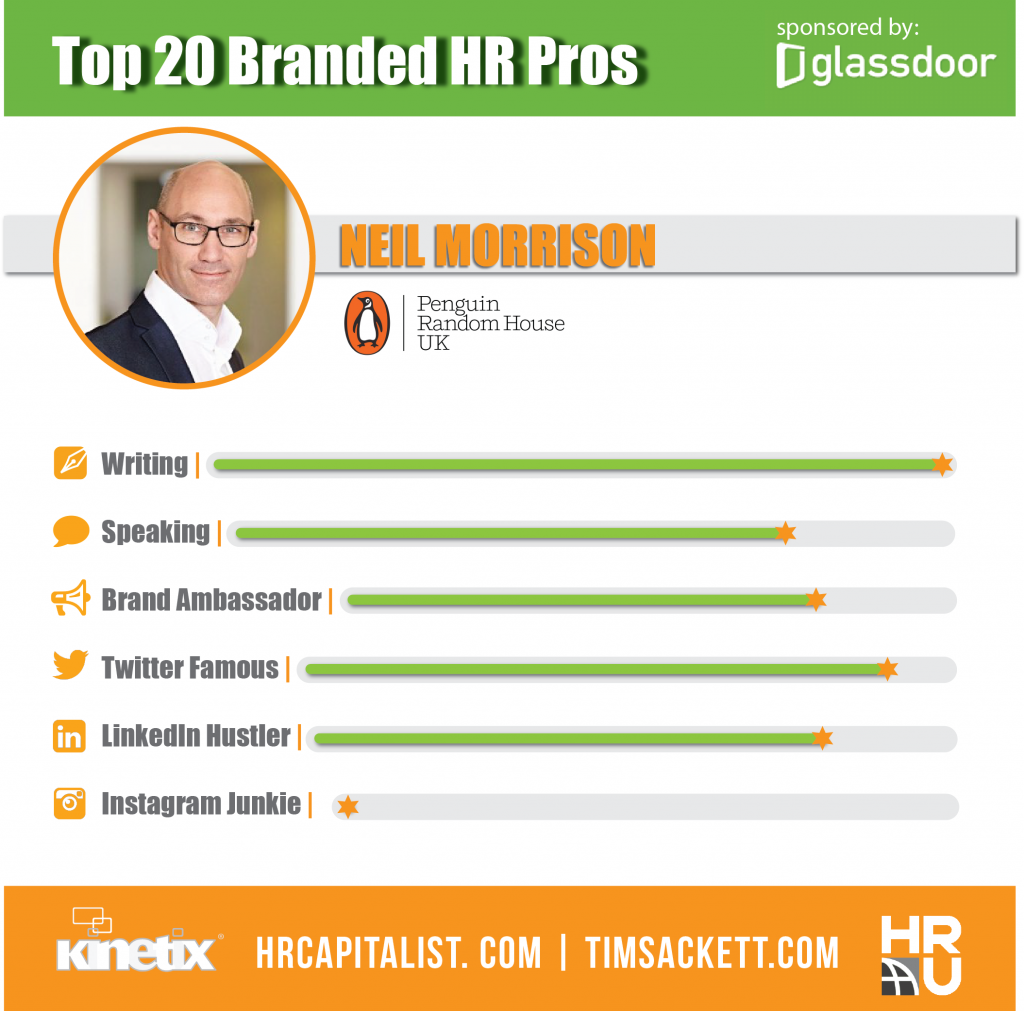Let’s face it – Fearful of the spotlight and conservative to a fault, HR pros generally aren’t the best examples to look towards when it comes to professional branding. Kris Dunn (Kinetix RPO, The HR Capitalist) and Tim Sackett (HRU Technical Resources, TimSackett.com) think that needs to change. That’s why they created this series – The Top 20 Branded HR Pros(sponsored by the team at Glassdoor).
KD and Tim searched the globe for HR Pros who used the tools at their disposal (writing, speaking, social and more) to brand themselves in the HR space, but limited the results to actual practitioners in the areas of HR, Recruiting and Talent Management. No consultants, no vendors. They found out well-branded HR pros who are actual practitioners are hard to find.
Tim and KD are running the Top 20 they found here on the HR Capitalist and at TimSackett.com. No rankings, just inclusion in the list and some notes on why. There are at least 20 well-branded HR Pros in the world. These are their stories.
_______________________________________________
Let me introduce you to HR Pro Neil Morrison! I believe Neil is the lone non-U.S. resident on Glassdoor’s list of the Top 20 Branded HR and Talent Pros. I’m not sure what that says about the list or Neil, but just a fact when you pull the data we did from Twitter, LinkedIn, Instagram, Writing and Speaking background and overall brand ambassador data, Neil showed up in a big way, all the way from the U.K.!
Neil is the Group HR Director for Penguin Random House in the U.K. For the U.S. audience that is equivalent to a SVP of HR in America. So, we have this big HR executive who has found the time to brand himself, and also understand the importance to his career, his profession and his organization.
I know Neil as a fellow Talent Advisor on CareerBuilder’s Hiring Site, where we have both been writing and speaking on live web chats for the better part of a year. Neil has a great English accent, so I kid him on the chats about how everything he says sounds more brilliant, to my ear, than it probably really is! He knows I’m kidding, because what he says is always brilliant!
Here’s Neil’s player card:

On the writing side of the fence Neil is the Kris Dunn and Laurie Ruettimann equivalent of HR blogging in the U.K., dare I say Mr. Punk Rock HR! He was one of the first, if not the first, HR bloggers to grab ahold of the U.K. audience with his smart, witty writing style, and he’s not afraid to tell it like it is. His blog is called Change-Effect.com where he writes about HR, Talent and Leadership weekly.
As a speaker Neil is active in CIPD (U.K. SHRM type organization) and speaks often to HR professionals all over the world. He is a true international brand advocate for his organization and CIPD. Neil has won several awards including the UK’s Most Influential HR Practitioner. Neil also has the most professional LinkedIn profile pic of any of the Glassdoor Top 20 Branded HR and Talent Pros!
He is all over the Twitters – @NeilMorrison with over 9,000 followers and 20,000 tweets, sharing his international HR perspective. The one thing I know about Neil, which is unique to someone at his executive HR level, is that he makes time for those who seek his help. Neil is a great mentor in HR to so many pros, and truly makes time to give back to the HR community.
What doesn’t Neil do well? He hates Instagram! He’s an amatuer photographer. So, Instagram is not something he enjoys to partake. Which helps to point out, to be well branded you don’t have to do everything, but you do have to do something really, really well!
Congratulations Neil!
————————————————————–
The Top 20 Branded HR Pros is brought to you by Glassdoor, who invites you to attend the Annual Glassdoor Employer Branding Summit on September 25th, where a stellar speaker lineup of industry experts and thought leaders exploring the intersection of employer branding and talent acquisition, the candidate experience and employee engagement.
Tickets are sold out, but wait! You can attend the livestream online featuring studio coverage with Kris Dunn and Tim Sackett by registering here (click to register). Fun and games are sure to be a part of that coverage.

